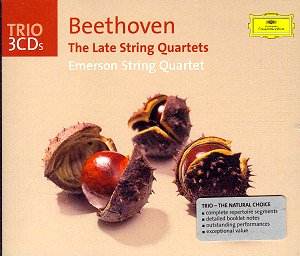This
is the second in the series of ‘Trios’ that I have been fortunate
to have reviewed during the last week and I remain most impressed.
Deutsche Grammophon have taken the late, great Beethoven string
quartets from their back-catalogue. These are original digital
recordings made in 1994-5 of the Emerson Quartet’s Grammy-winning
complete survey of the quartets.
Listeners
and collectors of the Beethoven string quartets are exceptionally
well served on disc with versions from many of the world’s greatest
chamber groups. There are fine interpretations most notably from
the Aeolian and Gabrieli Quartets on Decca, the New Budapest Quartet
on Hyperion, the Alban Berg Quartet on EMI, the Lindsay Quartet
on ASV and the Italian Quartet on Philips. The version that I
am most familiar with is the digitally re-mastered set, recorded
in 1968-69 from the Italian Quartet. This is still generally accepted
today as the main recommendation.
It
is difficult to look at other versions of great works when there
is a particular favourite recording with which we are familiar
and most satisfied. That said, I had no problem approaching this
review copy with great anticipation. I was rewarded with what
I consider to be revelatory performances. Clearly your version
of choice is a matter of personal taste. Many will find the Emerson’s
readings too idiosyncratic, particularly with regard to their
frequent use of quicker than usual tempos. The tempos are swifter
than those which I am used to. However I was captivated by their
performances which came across with the spontaneous joy of live
music-making rather than interpretations contrived in a studio.
The
eminent Italian Quartet offer contrasting interpretations to those
from the Emersons. Theirs are readings that are undoubtedly stylish
and exceptionally well polished. They have that sense of many
years of experience and of practice which almost makes perfect;
almost to a formula in fact. The tempos from the Italian Quartet
are measured with a clear and smooth tone which is acknowledged
as perhaps their major asset.
Looking
across the release as a whole the Emersons demonstrate awesome
energy and a real strength of character throughout. They have
a cultivated ear for detail which could come across as exaggerated
at times, yet it all seems to fit together so well. The Emersons
have the innate ability to shape each of Beethoven’s scores with
a sure sense of direction. The playing is sensitively balanced
with genuine expression. This is beautiful heartfelt playing and
when they switch into rapid-fire mode it all makes for an exhilarating
experience. It is amazing how just four players can sound so magnificent.
At times it seemed as if I was hearing a symphony orchestra. The
force of unity of teamwork is exceptional with a sense of the
players breathing as one. It is easy to lose sight of the players
as individuals. Each demonstrates impeccable tone and instrumental
mastery.
The
late Beethoven quartets from the Italian Quartet are available
on two Philips ’Duo’ sets 454 711-2 and 454 712-2 and although
recorded in the late 1960s still sound exceptionally fine. The
sound of this Deutsche Grammophon ‘Trio’ release is on the warm
side perhaps at the expense of instrumental clarity. Yet this
feels like hair-splitting. It should not detract from a fine sound
overall. There are comprehensive booklet notes.
This
set from the Emerson’s would make a wonderful and attractive addition
to any collection. An indispensable recording of Beethoven’s chamber
masterpieces.
Michael
Cookson
